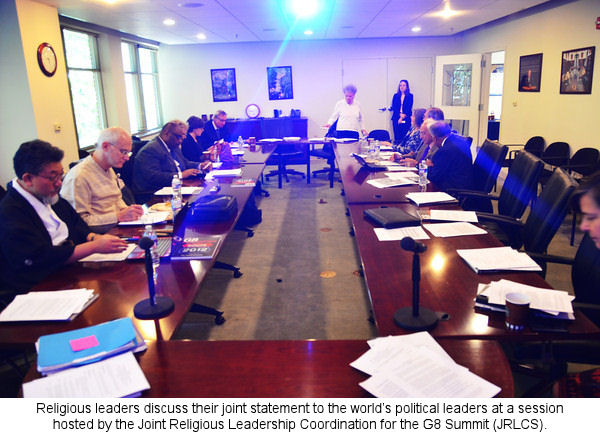Dharma Traditions’ Perspective Enhances Religious Leaders’ Statement to G8
By Keshava Sharma | Май 25, 2012

Religious leaders gather in Washington, D.C. to issue joint statement to the world’s political leaders.
On May 17, 2012, the Joint Religious Leadership Coordination for the G8 Summit (JRLCS) gathered representative organizations and delegations from G8 and G20 member communities for a closed meeting at the Berkley Center for Religion, Peace & World Affairs at Georgetown University. The session extended a long history of religious and interreligious organizations using the occasion of global summits to articulate shared moral concerns and policy recommendations.
Following a tradition of religious leaders speaking together during major political summits, the representatives also met to interact with scholars and government officials and to issue a joint statement. The religious leaders made personal and community commitments and offered recommendations to address economic justice, food, health, human security, and poverty issues.
Coming together in a spirit of pluralism and proclaiming peace and equality, the group acknowledged the tumultuous times of violence and economic instability seen around the world and offered reflections and recommendations as part of this joint statement to the G8 and G20 leaders.
Part of the endeavor was headed up by a coalition of many persons, including the Reverend Bud Heckman, Executive Director of Religions for Peace USA. Representing the broader Hindu and Jain traditions were Anuttama Dasa, from International Society for Krishna Consciousness (ISKCON), and Arvind Vora, from the Federation of Jain Associations in North America.
In addition to helping develop the final document, Dasa and Vora advocated the inclusion of a statement within a section focused on health issues that urged the G8 leaders to promote and educate their citizens about the benefits of a plant-based diet. It was advocated that this would provide more food for the world’s hungry population, minimize the environmental degradation caused by meat-centered diets, and improve the health of people worldwide by reducing heart disease, diabetes, and many forms of cancer. While the proposal was not accepted in its entirety, a reference to the importance of a plant-based diet was contained in the final statement.
“It is important that Hindu and other dharmic communities participate in these interfaith efforts to call upon the world’s political leaders to act in morally responsible ways while addressing the challenges of our day,” commented Dasa. “It is my hope that core principles including truthfulness, compassion, self-discipline and cleanliness, which are vital for the spiritual and secular progress of society, will guide our leaders in all their decision-making processes.”
The final statement reflected the shared values of the various religious traditions that were present, including Christian, Jewish, Muslim, Zoroastrian, Sikh, Baha’i, Shinto, Buddhist, Hindu and Jain. The assembled religious leaders underlined the need to promote these values through education, policy, and practice, while simultaneously promoting respect between, and of, religions and other minorities.
The joint declaration can be viewed at: http://repository.berkleycenter.georgetown.edu/120517FinalStatementJRLCS.pdf















